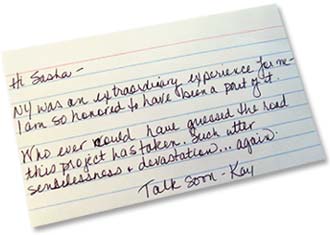
by Sasha Aslanian | |
PRODUCER'S NOTEBOOK
The Story Behind Kay Fulton's Diary
Over the last few months, as I've worked with Kay to finish this diary project, friends and colleagues have asked, "How did you find Kay?" "Why did she want to watch the execution?" and "How does someone keep a radio diary?"
Kay Ice Fulton grew up in Midwest City, Oklahoma, a small community outside Oklahoma City dominated by the presence of Tinker Air Base. Kay describes a very happy all-American childhood. Take a tour of Midwest City with Kay. There were five children in the Ice family. Kay is the youngest and Paul, the middle child, was nine years older. Because of their age difference, Kay's fondest memories of Paul came as young adults when they were both living in Midwest City in the early 1990s. Her office was near the Federal Building where her brother worked as a U.S. Customs Agent and they socialized frequently.

|
On the morning of April 19, 1995, Kay was in her office filing papers near a large window that faced the Federal Building. She was thrown to the ground by the force of the explosion that tore off the front of the Federal Building three blocks away. It would take several hours before she realized her brother might have been among the victims, and eight days until they found his body. Hear Kay's description of the day of the bombing
Kay spent the next six and a half years as an anti-terrorism activist. She testified before Congress on anti-terrorism legislation, served as a witness at bomber Timothy McVeigh's federal trial in Denver and networked with Pan Am 103 families. She did countless media interviews, always making sure to mention Paul's name. Kay viewed the media as a way to let more people know about her brother, and the Oklahoma City family members' work.
Stephen Smith and I met Kay after she had been selected to view McVeigh's execution in June of 2001. She viewed this as the final thing she could do for her brother. I found myself wondering how the execution would affect her. At the time, Kay seemed pretty ambivalent about the death penalty. She said she could understand the arguments on both sides, but felt it was important to witness the execution anyway.
We asked Kay if she'd be willing to keep a radio diary about her response to the execution in Terre Haute. We anticipated that that over the following months, Kay would record her thoughts and feelings about the McVeigh's death and her healing. We were curious, would the execution make her more or less in favor of the death penalty? Would it bring "closure" or introduce new dilemmas?
Kay agreed to keep an audio diary, saying that she wanted people to know about her brother, Paul. So, a few weeks before the execution, we traveled to Red Wing and equipped her with a small mini-disc player, headphones and a microphone. Kay began sending disks to us as she finished recording them. Her description of the execution as she's driving back from Terre Haute was incredibly intimate, detailed and raw. To hear an extended excerpt, click here. At that point, we knew we had a good story.
After the execution, Kay was upbeat. A month later, she took a job at a deli—her first job in several years. She was closing the chapter on her work as an anti-terrorism activist, and feeling at peace that Paul's life and death would not be forgotten.
Then September 11th happened. As I watched the television images, I wondered how Kay was reacting. What must it be like to witness such horrifying new acts of terrorism when you have lost a family member that way years ago?
I called her house and she answered in her bright, cheerful way. She didn't know about it. I told her what had happened and asked her to turn on her television.
Over the next few months, Kay continued to record her audio diary as she began to connect with the 9/11 families. The experience brought Oklahoma City back for her, but also offered her a chance pass along the outpouring of support her family had received. She could see how far she and the other Oklahoma City families had come by what they had to offer the newest victims of terrorism. She traveled twice to New York, welcomed New Yorkers to Oklahoma City for this year's bombing anniversary and has offered all kinds of help, all the way down to licking stamps and posting letters for a World Trade Center family group founded by her friend, Anthony Gardener. Hear Kay's interview with Anthony.
After the 7th anniversary of the Oklahoma City bombing, we began to put the final story together. We knew that Kay had an important story to tell, and wanted to keep that story as simple as possible. Forming the core of the story is the more than 30 hours of audio Kay recorded for this project; to that we added just a few moments of Paul's voice caught on a surveillance tape, answering machine messages, and some audio from TV news coverage.
We're grateful to Kay for allowing us to bring our microphones, minidisks, phone calls and interruptions into her life. We could not have done it without Kay's belief in telling her story, and her willingness to let NPR listeners know what terrorism has cost her.

